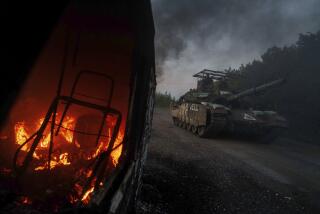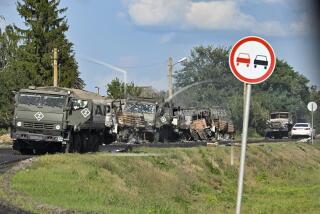Soviets Tighten Lithuania Squeeze With More Troops, Border Patrols : Secession: Kremlin officials say they are prepared to control imports to the republic.
- Share via
MOSCOW — The Soviet Union squeezed little Lithuania a bit harder on Tuesday as the KGB, the Soviet security agency, announced the reinforcement of its troop deployments and increased border patrols in the secessionist republic and other central government officials warned that it would not be allowed to import strategic materials without Moscow’s permission.
The KGB’s Border Guards had moved more troops into Lithuania following orders from President Mikhail S. Gorbachev to secure the Soviet Union’s state borders there, a spokesman said, and they are now closely controlling all movement into the republic from outside the country.
Soviet officials, meanwhile, told the official news agency Tass that the central government is prepared to exercise its right to be the exclusive importer of any goods into the Soviet Union. This would thwart any Lithuanian efforts to buy oil and raw materials abroad to compensate for supplies that have now been curtailed or cut off as part of Moscow’s economic pressure on the republic.
The two moves increased the pressure on Lithuania to abandon its six-week-old, unilateral declaration of independence from the Soviet Union and to negotiate its secession from the country on Moscow’s terms--that is, within the framework of the Soviet constitution and law and on a timetable that permits Gorbachev to stem the breakup of the Soviet Union through further political and economic reforms.
But a Lithuanian delegation, sent to Moscow to meet with senior Kremlin officials to discuss opening negotiations, was told Tuesday that nobody of appropriate rank was available to see them.
“We have come to talk, but there seems to be no one here we can meet,” Bronislavas Kuzmitskas, the delegation head and a deputy chairman of the Lithuanian Supreme Council, the republic’s legislature, said. “We get excuses, evasions or simply no answers when the telephone rings.”
In Lithuania, life slowed even more perceptibly under the central government’s curtailment of energy supplies and raw materials. Traffic in Vilnius, the capital, was reduced to trolley buses, taxis and a few official cars.
Factories have fuel supplies for no more than five days, Lithuanian officials announced. The republic’s major oil refinery shut down Monday, they said, and its major non-nuclear power plant also faces closure.
The whole economy is quickly being paralyzed, according to Lithuanian officials. Curtailment of natural gas shipments has stopped the manufacture of nitrous fertilizer, shortages of raw materials will soon close a factory making television tubes and reductions in shipments of Cuban sugar have halted the production of candy.
Those suppliers that continue to provide raw materials to Lithuania are not getting paid for them because of a restrictions on bank transfers, according to Lithuanian officials, and they consequently are now shipping much less. Lithuanian factories, as a result of the same Moscow-ordered freeze, are not being paid for the goods they have supplied.
The Lithuanian Supreme Council appointed a special commission Tuesday to coordinate the republic’s response to the increasing blockade, and government officials spent most of the day in conference with Prime Minister Kazimiera Prunskiene, who had just returned from visits to Denmark, Norway and Sweden in search of assistance.
Lithuania is hoping to replace some of the reduced supplies, especially oil, with imports, but the twin announcements of strict controls on strategic imports and the KGB’s increased border patrols appeared to be a warning that the central government will oppose this.
As reported by Tass, the central government’s readiness to block strategic imports, including the oil and raw materials now denied Lithuanian factories, appeared calculated to have primarily a psychological impact. As a practical matter, Lithuania does not have much power to buy imports. It has only limited amounts of foreign currency banked abroad to pay for such purchases--and oil purchases alone would cost up to $55 million a month.
Officials of the State Supplies Committee in Moscow said that their facilities, including the oil terminal at the Lithuanian port at Klaipeda and railway tank cars, will not handle any Lithuanian purchases not authorized by the central government.
They also underscored, in interviews with Tass, the exclusive right the Soviet state has to import strategic goods, suggesting that Moscow would block a wide range of vital supplies to Lithuania, including not only oil and gas but also steel and other metals, cotton, fodder and grain.
“As the abortive attempts to find potential partners continue, the situation in the republic is such that there are no guarantees of getting permission to import hydrocarbons or of the readiness of the Lithuanian economy itself to handle this,” Tass said.
Lithuania’s isolation was underscored by the considerable attention given to the activities of the KGB’s Border Guards in “strengthening the protection of the Soviet state border on Lithuanian territory,” phrasing that gives the impression in Russian of sealing the republic’s frontiers.
Operating aboard patrol boats and naval vessels in the Baltic Sea, the Border Guards “stepped up surveillance over possible contacts between Soviet vessels and foreign boats in (Soviet) territorial waters and within the Soviet economic zone to avert the transfer of weapons and ammunition to Lithuania,” Anatoly Parakhin, the Border Guards spokesman, told a briefing for Soviet journalists at the unit’s headquarters here.
“The movement through the border of all cargo and means of transportation is being most closely controlled,” Parakhin said.
A quarter-million rounds of ammunition for hunting rifles, which are widely held by farmers, were confiscated two weeks ago on their way to Lithuania aboard a Soviet ship that had sailed from West Germany, Parakhin said.
Times staff writer Parks reported from Moscow and Schrader, a free-lance journalist, from Vilnius.
More to Read
Sign up for Essential California
The most important California stories and recommendations in your inbox every morning.
You may occasionally receive promotional content from the Los Angeles Times.













